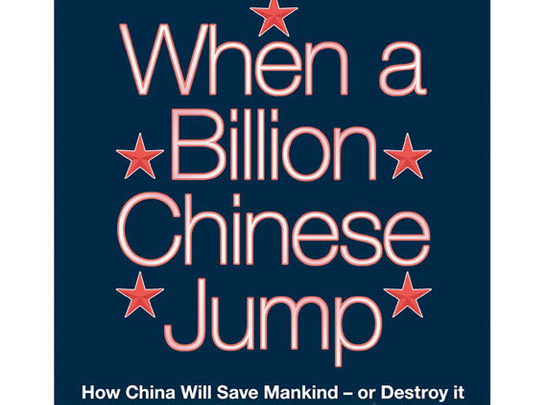
It is always wise to be careful what you wish for. When China was poor and communist, its government disdained consumption and castigated the evils of capitalism, while in the West it was argued that happiness lay in the joy of stuff. The good news is that China now agrees about the stuff, embracing a strange hybrid capitalism with distinctly Chinese characteristics. But that is also the bad news, as Jonathan Watts memorably explains in When a Billion Chinese Jump.
The title derives from a boyhood nightmare: The Chinese, Watts thought then, were so numerous that if they all jumped together they could knock the world off its axis. Now that most of China's 1.4 billion people prefer to live better today than to trust the promise of a socialist paradise tomorrow, the shock to the world's economy, atmosphere, soil, water, forests and natural resources seems set to trigger his boyhood terror: The demands of a billion Chinese bent on becoming prosperous consumers could indeed, on China's present trajectory, knock the world off its axis.
Each industrial revolution has been dirty and environmentally damaging. But while industrialisation was confined to a handful of relatively small countries, the environmental impacts, climate aside, were relatively local. In China, though, carbon-fuelled industrialisation and unsustainable development has metastasised by virtue of its scale and speed into the global game-changer of Watts's title. The West invented unsustainable living; China has taken it up with enthusiasm.
Price of pillaging
China's growth was kick-started by the export of cheap goods produced by low-paid country women labouring in the factories of eastern China. More, cheaper, faster does not easily accommodate cleaner or sustainable but for the first 20 years, few people cared. In the past ten years, the bills have begun to come in: They include acute and chronic water shortages, toxic algae blooms, desertification, acid rain, dying grasslands and angry people.
In Beijing there are efforts to turn to a less destructive course. Sustainable development is now the mantra of government policy and China is committed to a low-carbon economy, not least to dominate the technologies of the future. But as Watts discovers, to accomplish this unprecedented feat at this stage of development requires more than shaky legislation and a fiat from the top. It requires a profound cultural shift away from the entrenched idea that nature exists to be exploited and plundered and that any environmental problem can be fixed by engineering.
Watts's journey takes us to nature reserves where the animals are served up in official banquets, to the tragic province of Henan, once held up as an exemplar of Maoist development, now stricken by poverty, soil exhaustion, corruption and an Aids epidemic.
The Yellow river, the birthplace of Chinese civilisation, is all but destroyed. The government has encouraged people to move west from the overpopulated heartland into the arid and mountainous lands of the Uighurs and the Tibetans, places able to support sparse populations but where ecosystems rapidly collapse under the weight of numbers. The days of the last remaining paradise, the astonishingly biodiverse province of Yunnan, according to Watts's account, are numbered.
If this is a bleak story, it is because the prospects are bleak. Watts tries to balance this journey through dystopia with signs of hope but we sense he would wish to be more convinced than the evidence allows.
This book is not simply an indictment of China's development path: It is a lesson for all in the dangers of how we live. Will we heed the lesson and will China's bid for sustainability prove more than a rebranding exercise? Any reader of When a Billion Chinese Jump must hope so.
Isabel Hilton's The Search for the Panchen Lama is published by Penguin.








